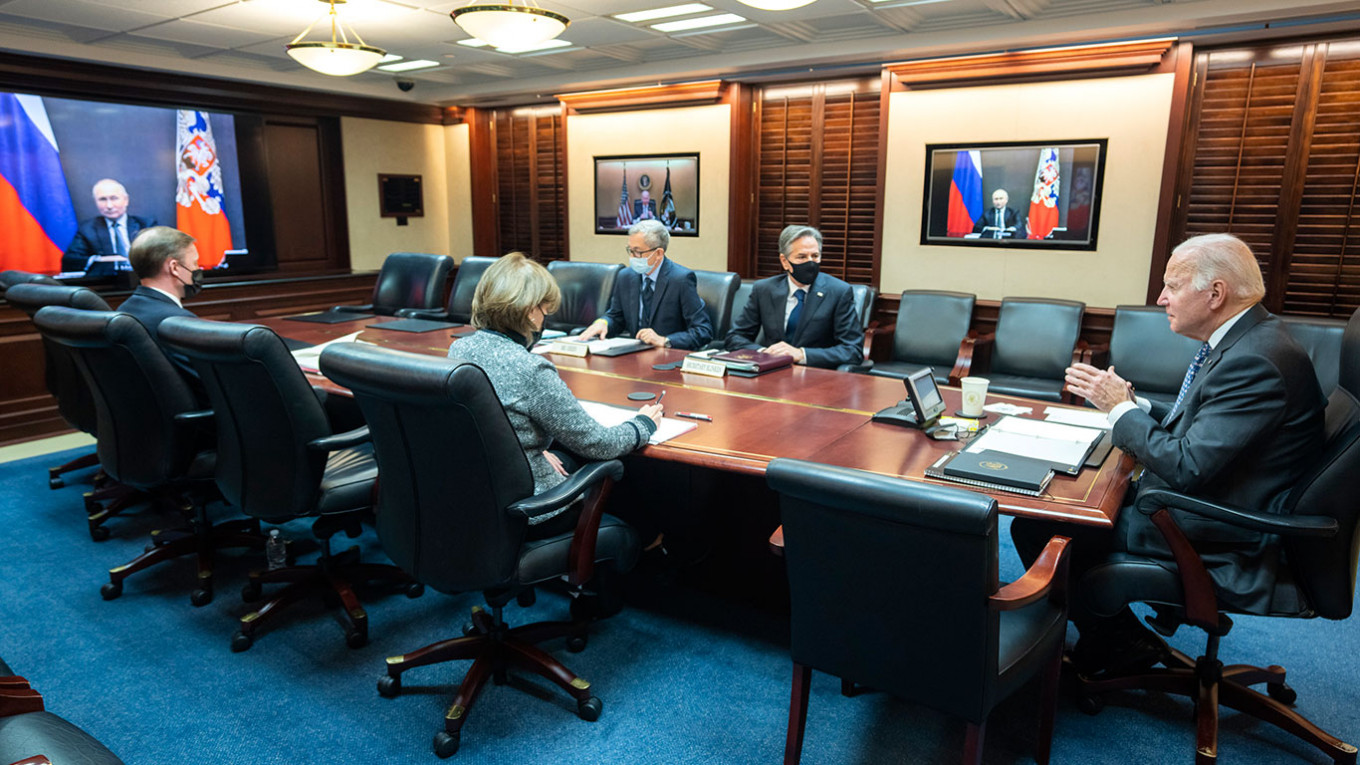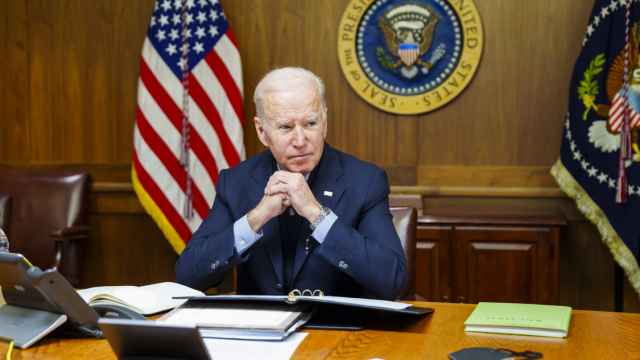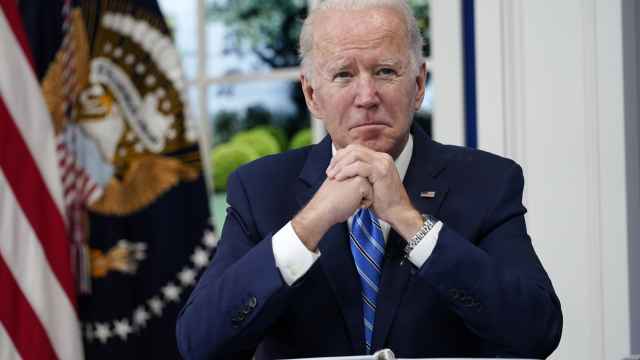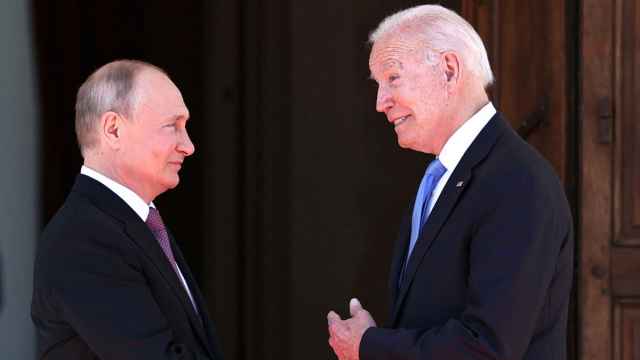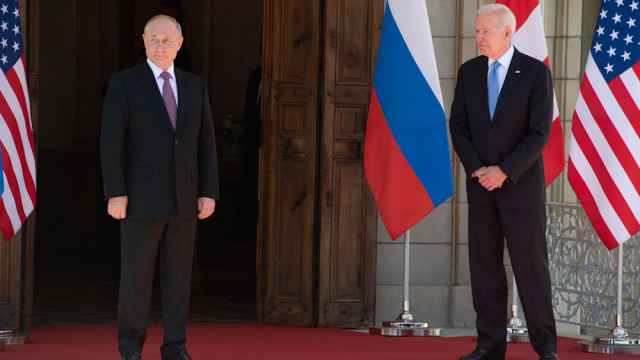Russian President Vladimir Putin and his U.S. counterpart Joe Biden held a high-stakes virtual summit Tuesday in hopes of easing tensions between Russia and Ukraine that have sparked fears of an all-out war.
The short-notice call came amid high alarm from Washington over Russia’s massing of troops near the Ukrainian border, with reports saying U.S. intelligence has information on a possible Russian invasion as soon as late January.
But although the Kremlin described the two-hour discussion as “frank and businesslike,” the path forward for both sides — and Ukraine — remains unclear.
Here’s a recap of what the two leaders discussed:
Western response if Russia invades Ukraine
“President Biden voiced the deep concerns of the United States and our European allies about Russia's escalation of forces surrounding Ukraine,” the White House said in a statement.
Biden “made clear that the U.S. and our allies would respond with strong economic and other measures in the event of military escalation.” The U.S. leader also “called for de-escalation and a return to diplomacy,” the statement said.
Biden's national security advisor, Jake Sullivan, said there were sanctions that Washington had held back from in 2014, when Russia annexed Crimea from Ukraine, but was "prepared to do now."
According to Bloomberg, these would include fresh restrictions on the Russian ruble, Russian sovereign debt, and on some of the country’s largest financial institutions.
Cutting off Russia from the SWIFT international payment system is also on the table if there is an invasion.
Nord Stream 2
Following the call, U.S. officials made clear that if the Russian leader does take military action against Ukraine, freezing the controversial Nord Stream 2 pipeline and its money-earning potential would be a key mode of retaliation.
The 10 billion-euro ($12 billion) pipeline, majority-owned by Russian giant Gazprom, was completed in September, just around the time the Russian buildup of some 100,000 troops near the border with Ukraine began.
“It is leverage for the West, because if Vladimir Putin wants to see gas flow through that pipeline, he may not want to take the risk of invading Ukraine,” said White House National Security Advisor Jake Sullivan.
Putin’s ‘red lines’
The Kremlin said Putin blamed NATO for tensions in Ukraine and insisted on “legal guarantees” against the Western military alliance expanding its forces any closer to Russia.
Putin says he sees Ukraine's growing alliance with Western nations as a threat to Russian security — and that any move by Ukraine to join NATO or to host NATO missiles would be unacceptable.
“Russia is seriously interested in obtaining reliable legal guarantees that will exclude NATO's eastward expansion and the deployment of offensive strike weapons in countries adjacent to Russia,” the Kremlin said.
Restoring diplomatic missions
Biden and Putin discussed options for restoring both countries’ diplomatic missions, which have been left hamstrung by several rounds of tit-for-tat diplomat expulsions. The U.S. Embassy in Russia has been forced to suspend nearly all services.
“The Russian side proposed to annul all the accumulated restrictions on the functioning of diplomatic missions, which could also serve to normalize other aspects of bilateral relations,” the Kremlin said.
What else was discussed?
Putin and Biden also discussed bilateral strategic stability plans set in place at their June summit in Geneva, efforts to fight ransomware and cybercrime and joint work on regional issues such as Iran.
What wasn’t discussed?
The pair did not discuss the poisoning and jailing of Kremlin critic Alexei Navalny, the banning of his groups as “extremist” or the controversial results of this year’s parliamentary elections. While Washington has criticized Russia over these issues, Moscow views such criticisms as interference in its domestic affairs.
Washington’s accusations of Russian meddling in its presidential elections were also absent from the conversation.
What are the results?
Apart from agreeing to keep dialogue open in the interests of maintaining international security, Biden and Putin appear to have failed to make any significant breakthroughs.
The White House did not say how Biden responded to Putin’s request for guarantees to halt NATO’s expansion or block Ukraine’s path to membership.
Sullivan told reporters that Biden "made no such commitments or concessions."
Biden is expected to speak with Ukrainian President Volodymyr Zelenskiy on Thursday.
Asked if Russia planned to draw down troops after the summit, the Kremlin's top foreign policy adviser Yury Ushakov said: "Russian troops are on their territory, they are threatening no one, the president has said so."
Ushakov insisted that a possible invasion of Ukraine by Russia had not been discussed.
AFP contributed reporting.
A Message from The Moscow Times:
Dear readers,
We are facing unprecedented challenges. Russia's Prosecutor General's Office has designated The Moscow Times as an "undesirable" organization, criminalizing our work and putting our staff at risk of prosecution. This follows our earlier unjust labeling as a "foreign agent."
These actions are direct attempts to silence independent journalism in Russia. The authorities claim our work "discredits the decisions of the Russian leadership." We see things differently: we strive to provide accurate, unbiased reporting on Russia.
We, the journalists of The Moscow Times, refuse to be silenced. But to continue our work, we need your help.
Your support, no matter how small, makes a world of difference. If you can, please support us monthly starting from just $2. It's quick to set up, and every contribution makes a significant impact.
By supporting The Moscow Times, you're defending open, independent journalism in the face of repression. Thank you for standing with us.
Remind me later.


